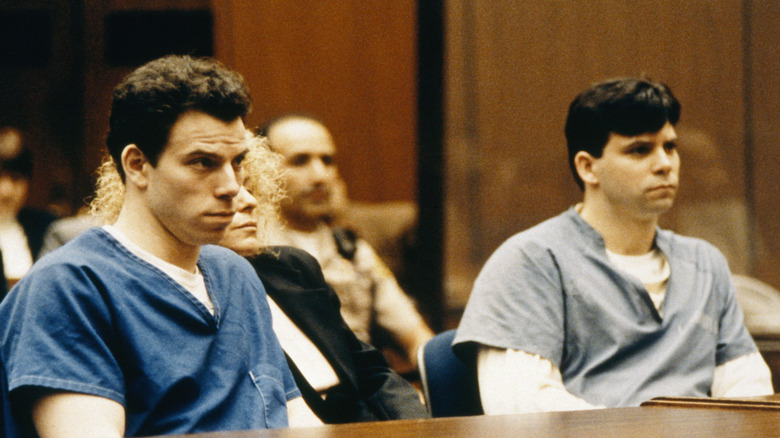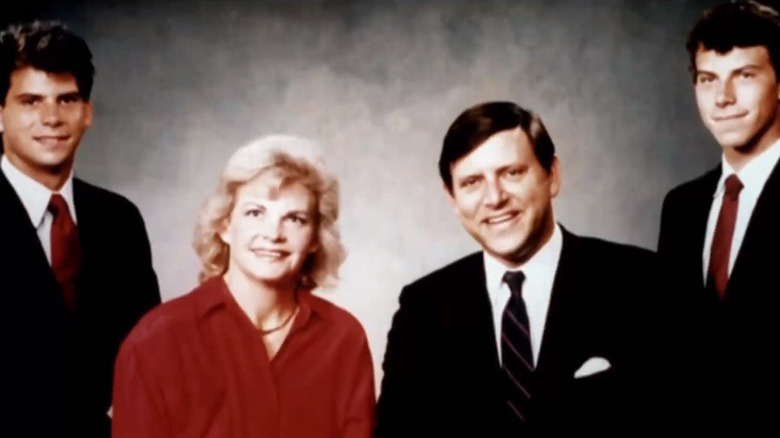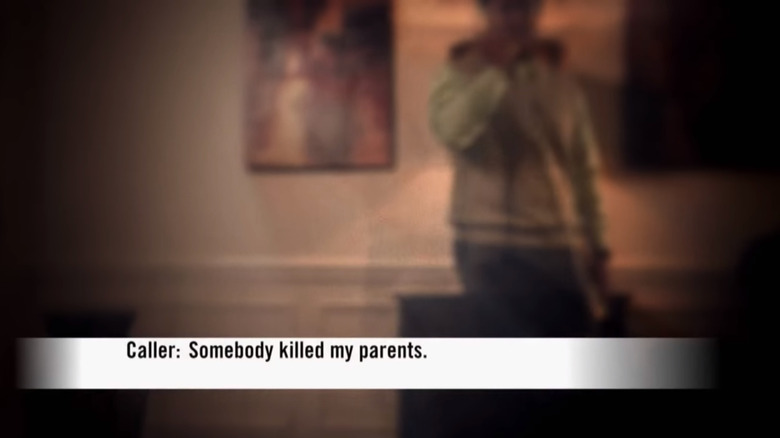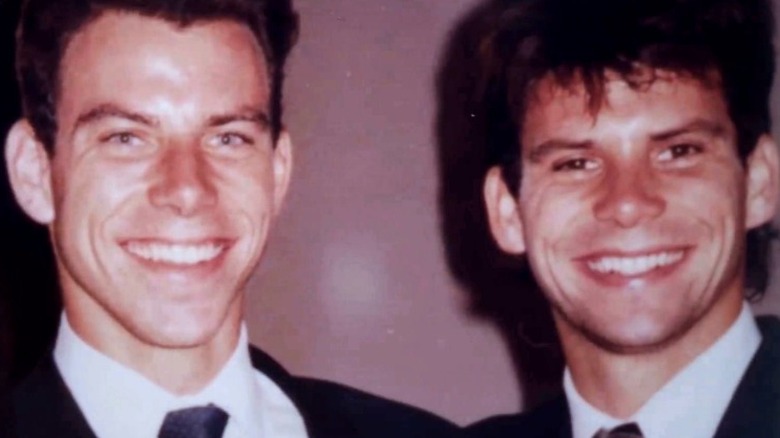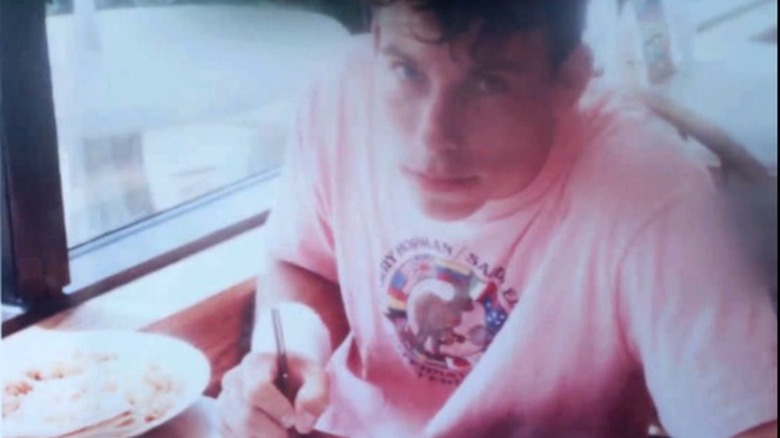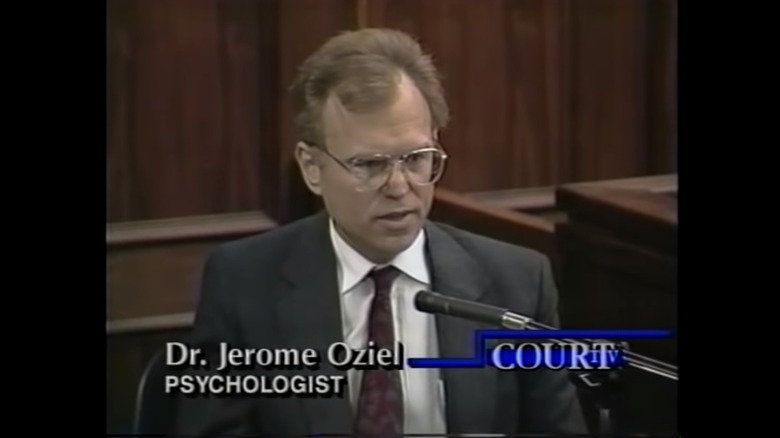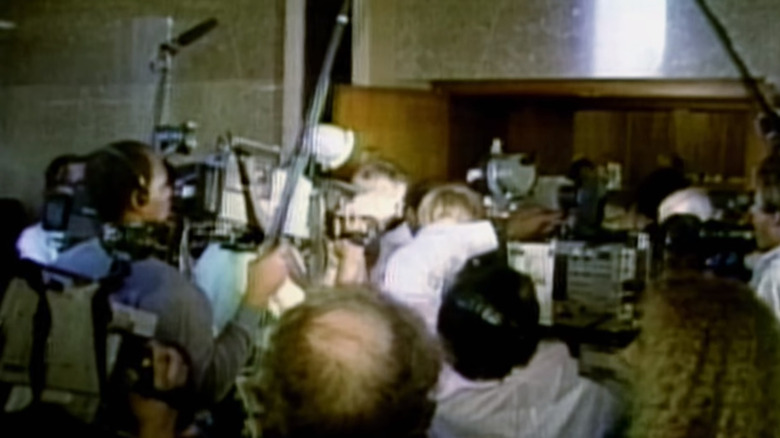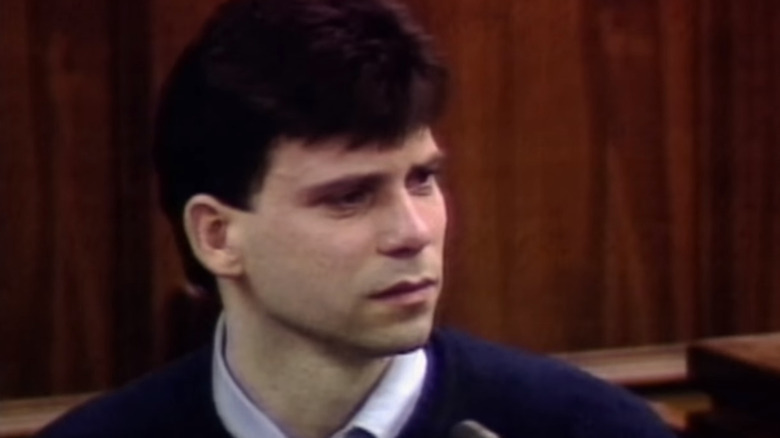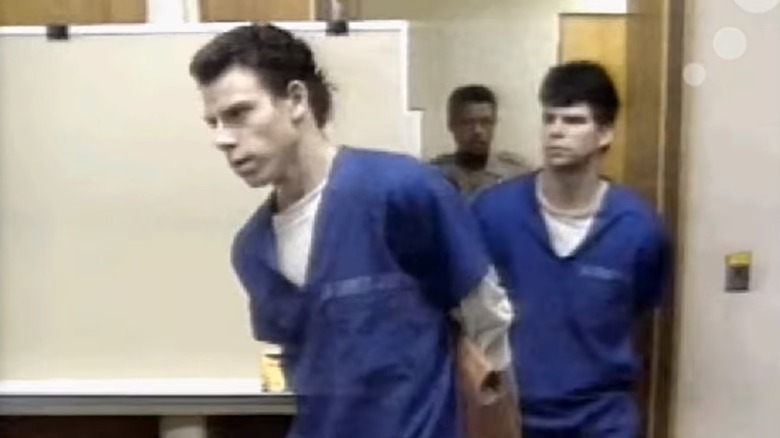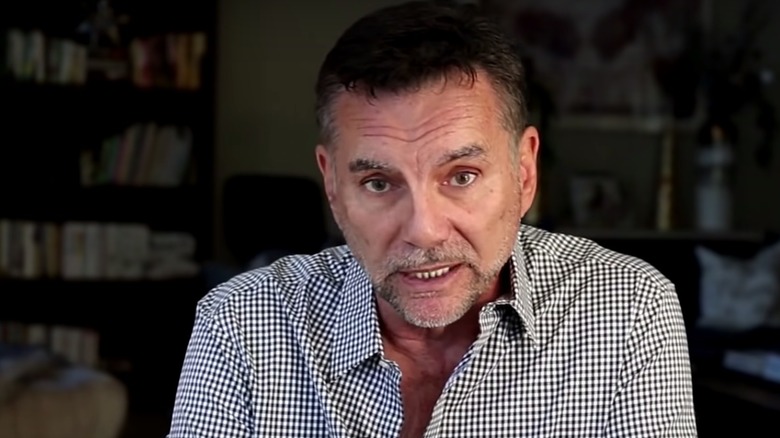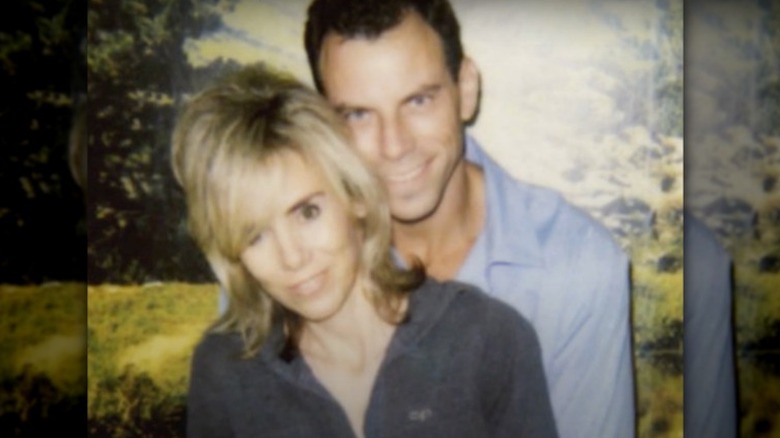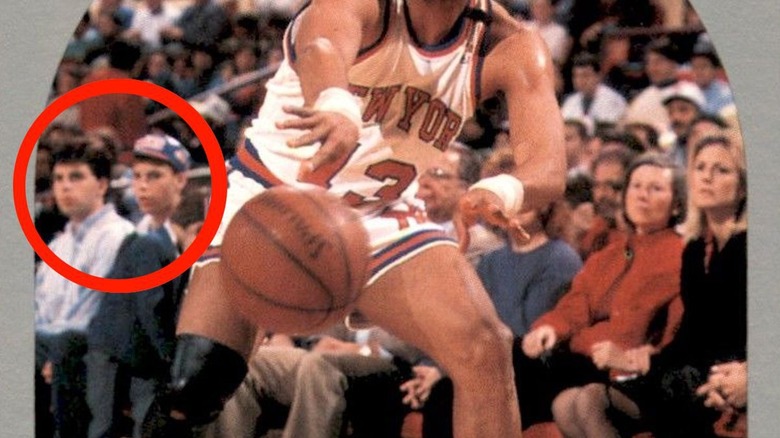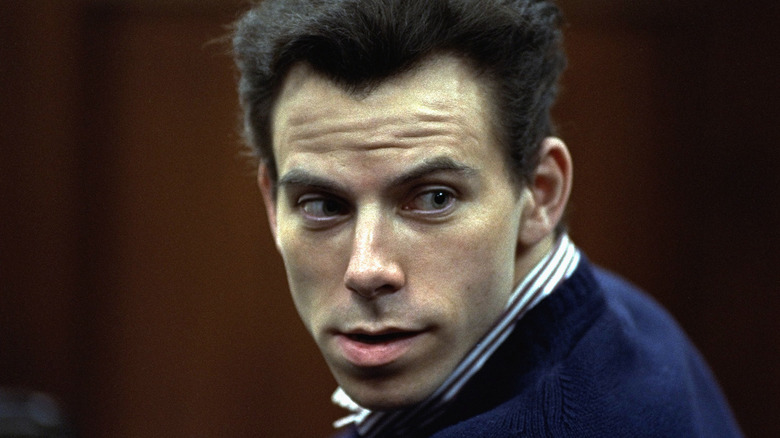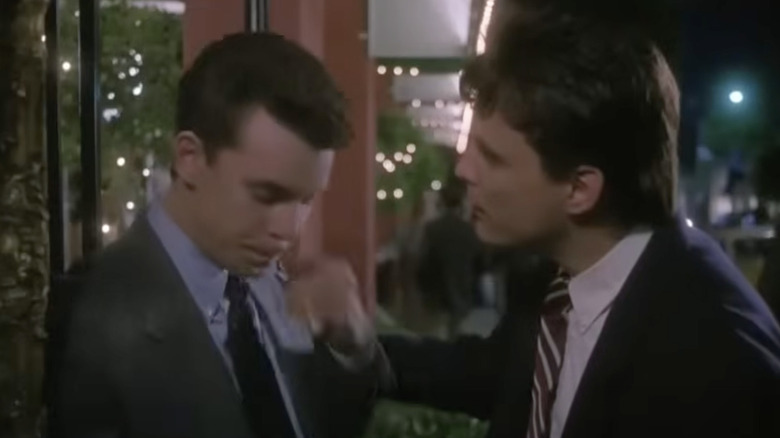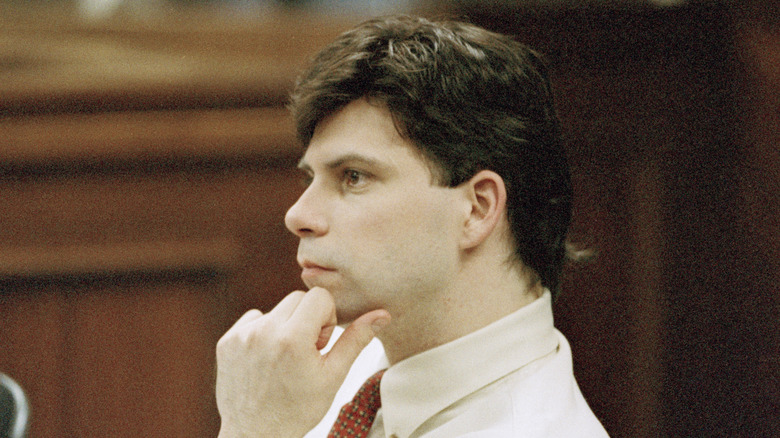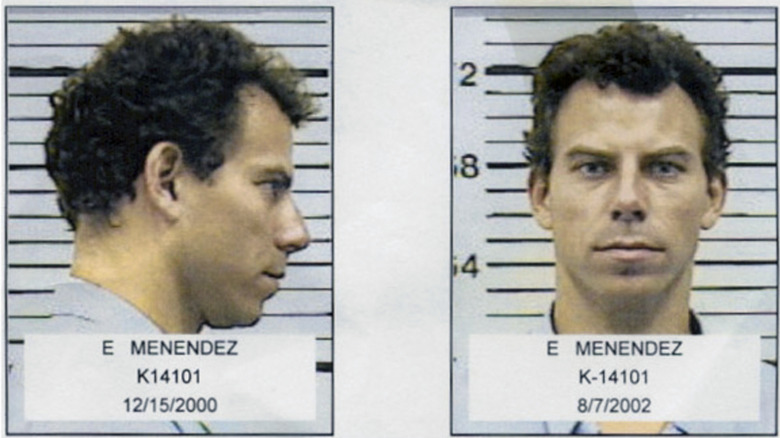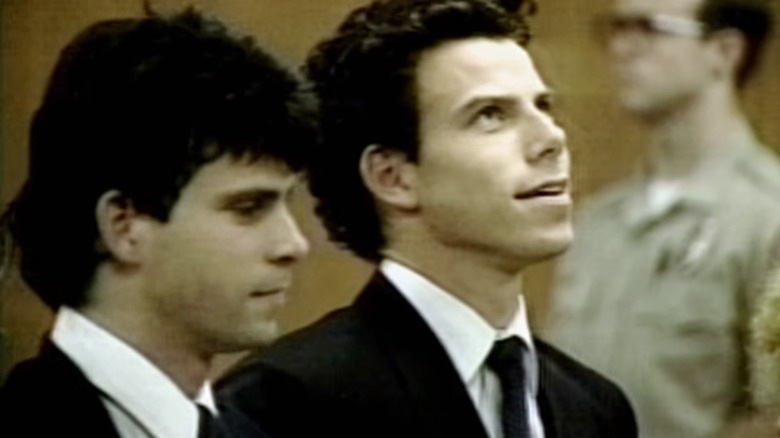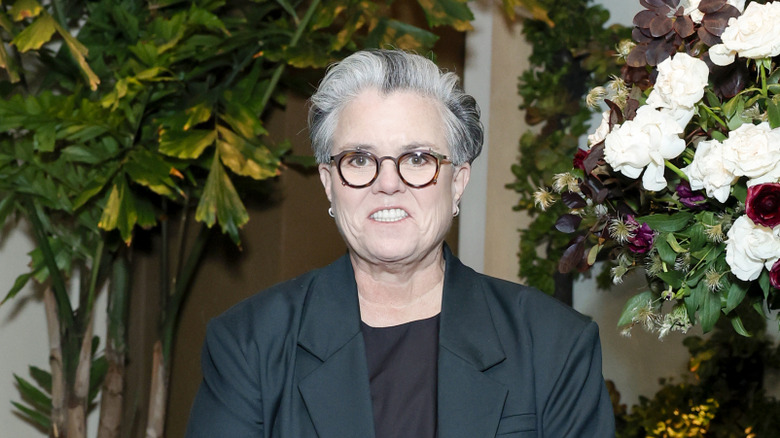The Untold Truth Of The Menendez Brothers
Let's turn the hands of time back to 1989, a landmark year in entertainment and technology. "The Simpsons (before it became repetitive)" and "Seinfeld" dominated TV, Tim Burton's "Batman" swung into theaters, Nintendo introduced the Game Boy to the world, and Sir Tim Berners-Lee finished drafting his concept for a little thing called the World Wide Web. It was also the year a horrific crime took place — a double parricide that, thanks to cable television, grabbed America's nigh-undivided attention (and arguably became the catalyst for the world's collective fascination with highly publicized true crime stories).
On August 20, 1989, 21-year-old Lyle Menendez and his 18-year-old brother Erik stormed into their Beverly Hills mansion. With a flurry of shotgun rounds, the brothers violently killed their parents, José and Kitty, doing enough damage to their bodies to render them nearly unrecognizable. From the events leading to that night to the media-fueled spectacle that followed, here is the untold truth of the Menendez Brothers.
Despite their wealth, the brothers grew up in a turbulent environment
By all appearances, Lyle and Erik Menendez seemed to live an idyllic life. Their father, 45-year-old José Menendez, was a self-made Cuban immigrant who went from Manhattan dishwasher to West Coast film executive. At age 19, he tied the knot with Kitty, who was two years his senior. The Menendezes lived in a posh New Jersey country estate before José's career made it necessary for them to relocate to a mansion in California. Aside from enrolling the brothers at an expensive private school, José also paid for thrice-weekly tennis coaching sessions in order for the brothers to excel at their chosen sport. Unfortunately, neither Erik nor Lyle seemed to share their father's itching, burning need to succeed.
From Lyle's academic difficulties to the brothers burglarizing their own neighborhood, José's frustration allegedly reached the point where he all but eliminated his children from his will. Judging by how Lyle supposedly deleted a copy of this will from José's home computer "by mistake," this may have been one of the major catalysts for the crime.
Based on Erik's own recollection of the Menendez brothers' sad childhood, their relationship with their father was far from healthy. In a weird, twisted way, Erik admired José, even as he constantly controlled, pressured, and pushed them to their limits. Perhaps Lyle, in an interview with ABC News published in 2017, said it best. "But I found that my own childhood prepared me surprisingly well for the chaos of prison life."
The Menendez Brothers were good actors
The night of their parents' murder, the police headed to the Menendez residence after receiving the brothers' 911 call (in which Lyle Menendez infamously wailed (via the BBC), "Someone killed my parents!"). According to some accounts, the sight of a bawling Erik Menendez curled up on the front lawn greeted the officers. Upon entering the mansion, they beheld a crime scene so brutal, they thought it was the mob's handiwork.
When Sgt. Tom Edmonds of the Beverly Hills Police Department spoke with the brothers that night, they already had an alibi prepared: After seeing a movie, they went to a food festival, came home some time before midnight, and stumbled upon their murdered parents in the den. Lyle also mentioned that when they entered their home, he caught a whiff of shotgun smoke. Despite this strange and somewhat inconsistent detail — as the smoke couldn't have lingered that long — Edmonds found the brothers' testimonies and trauma so believable that he didn't ask them to undergo testing for gunshot residue.
In other words, Lyle and Erik successfully lied and cried their way out of trouble that night. In hindsight, considering how the younger Menendez's acting skills earned him recognition at Beverly Hills High, this wasn't entirely surprising. Days later, Lyle hired armor-clad bodyguards for his and Erik's protection, which further sold their story. After they served their purpose, Lyle fired them without batting an eyelash.
The brothers spent their inheritance lavishly
One would think that the best way for the only heirs of a $14-million estate to get away with murder would be to keep things low-key. Well, that just wasn't how the Menendez brothers rolled.
After some rather convincing public displays of grief and pain, it didn't take long for them to dip their hands deep into the million-dollar Menendez cookie jar. In the months that followed, the brothers blew their insurance payout on a gambling spree, high-end hotel rooms, condominiums in the posh Marina del Rey area, three Rolex watches, a $40,000 shopping spree on clothes, and a $64,000 gray Porsche Carrera.
In addition, Erik Menendez purchased a Jeep Wrangler and booked a $60,000-a-year tennis coach to further his pro-athlete aspirations, while Lyle Menendez reportedly plunked down $550,000 on a New Jersey restaurant that students frequented for its popular chicken wings. Lyle also set up a company, Menendez Investment Enterprises, with which he intended to penetrate the hospitality, entertainment, and real estate industries. He even invested $40,000 in a Los Angeles rock concert, an endeavor that ultimately failed when his associate bailed on him. All in all, the brothers spent about a million dollars in just six months, a feat that Lyle would later attempt to justify as their perfectly natural response to a traumatic event.
Erik Menendez co-wrote a screenplay that seemed eerily familiar
In 1988, a year before the gruesome murder of his parents, Erik Menendez and his tennis pal Craig Cignarelli churned out a 60-plus-page screenplay titled "Friends," which featured the lead character, a wealthy teenager named Hamilton Cromwell, murdering his parents to receive his inheritance. While the screenplay itself wasn't exactly Hollywood-worthy material, it unsurprisingly became relevant to the investigation. After all, the events in the script paralleled the real-world crime in which the author's own parents were the victims.
In a 2017 ABC News interview, Cignarelli noted the unnerving similarities between the opening scene of their screenplay and how the Menendez brothers ended the lives of their parents. Cignarelli also revealed that Erik trusted his best bud so much that the younger Menendez confessed to him about the gruesome crime, even sharing the gory, hyper-specific details of what transpired that night. The truth turned out to be so horrifying that Cignarelli was secretly hoping for Erik to tell him that it was all a joke.
The most disturbing detail about this screenplay? Kitty Menendez herself helped Erik type it, meaning she may have unknowingly spelled out her own murder.
The Menendez Brothers spoke to (and threatened) their therapist
Due to the Menendez brothers' knack for thrill-seeking thievery before the murders took place, the court ordered Erik Menendez to see Dr. L. Jerome Oziel, a Beverly Hills psychologist. Killing their parents had taken a toll on Erik's mental health, one that his confession to Craig Cignarelli was not enough to address. He ended up telling Oziel about it as well, and when Lyle Menendez found out about it, he was understandably incensed. The older Menendez brother threatened to silence Oziel permanently if word got out about their guilt.
After almost five months since their parents' murder, this proved to be the brothers' downfall. Judalon Smyth, Oziel's estranged mistress, who knew about the recordings, reached out to law enforcers to tell them about the taped confessions. Los Angeles cops arrested Lyle on March 8, 1990, in Beverly Hills, and Erik surrendered to the LAPD on March 11. The brothers essentially roamed free for nearly seven months after the double murder.
Under normal circumstances, the law would render the recorded sessions inadmissible in court, honoring the confidentiality clause between therapists and their clients. However, Lyle's rage-fueled murder threat voided the doctor-client privilege of the parties involved. Still, it took two years before the Supreme Court of California permitted two of the three tapes to serve as evidence in the brothers' subsequent trial.
If you or someone you know needs help with mental health, please contact the Crisis Text Line by texting HOME to 741741, call the National Alliance on Mental Illness helpline at 1-800-950-NAMI (6264), or visit the National Institute of Mental Health website.
Their 1993 trial became a TV spectacle
Long before podcasts, streaming, and police procedural television shows could feed our hunger for true crime stories, there was the Courtroom Television Network (Court TV), a cable television channel established in 1991 that specialized in crime-themed programming and broadcasts of legal proceedings.
When Court TV started airing the Menendez brothers' trial on July 20, 1993, audiences in the United States eagerly tuned in to the historical moment. Due in large part to the tragic details of the case, people at the time couldn't stop talking about it. The trial showed that even without star power, sheer drama is enough to keep viewers glued to their screens. Aside from the brothers, another key player was their attorney, Leslie Abramson. At the time, she had already gained notoriety as a particularly ferocious defense lawyer.
Among the most significant and shocking developments in the trial was the revelation that José Menendez (and to a lesser extent, Kitty Menendez) allegedly harassed and assaulted the brothers. The defense team depicted José as a violent, abusive father and an unfaithful husband, while also accusing Kitty of substance abuse and neglect. In the end, however, the defense team could not present undeniable proof of any of these allegations. And the brothers' habit of high-fiving each other after testifying certainly didn't help make their accusations convincing.
If you or someone you know is dealing with domestic abuse, you can call the National Domestic Violence Hotline at 1−800−799−7233. You can also find more information, resources, and support at their website.
Lyle Menendez's secret toupee
If the brothers are to be believed, their parents' alleged abuse would have remained a family secret, were it not for the exposure of another. Lyle Menendez testified that on August 15, 1989, his mother pulled off his toupee during a heated fight. Upon seeing this, Erik Menendez allegedly comforted his brother, who ended up confiding in him about their father's continued abuse. They vowed to put a stop to this by facing Jose Menendez together, but according to Erik, their father's response felt like a threat to their safety.
The wig itself looked convincingly real. Furthermore, no one in the police department expected a 21-year-old with a seemingly robust rug of hair to actually be bald underneath. As the story goes, the truth behind Lyle's toupee only became widespread knowledge when an inmate at the Los Angeles County Jail sent the older Menendez brother's hairpiece flying in the shower. As prison rules prohibit inmates from wearing wigs — a bid to prevent them from smuggling drugs and other small contraband materials into their cells — Lyle could only wear his wig in the courtroom.
They were convicted after two trials and three juries
From an outsider's perspective, the Menendez brothers case may seem like an easy one. After all, the sheer amount of evidence should realistically be enough for the jury to reach a decision, right? Well, not exactly. Lyle and Erik Menendez underwent separate trials, with each of them having their own jury. Both of these initial proceedings, however, ended in mistrials in 1994, as the juries could not come up with a single verdict for either case.
One year later, the Menendez brothers' retrial took place, under just a single jury. This time around, however, they no longer had the nation's full attention. For starters, the presiding judge, Stanley Weisberg, prohibited cameras in the courtroom. Additionally, there was significantly less time spent on the abuse angle, and the jurors were made to vote on whether to convict the brothers of murder, not the lesser offense of manslaughter. And of course, there was the fact that their retrial happened at around the same time as another high-profile court drama: the wild trial of former NFL player O.J. Simpson.
Ultimately, the jury reached a guilty verdict on March 20, 1996, but spared the brothers from the death penalty. Lyle and Erik received an arguably more lenient punishment — two consecutive life sentences, with no possibility of parole.
A former mob boss shared a cell with them
The noteworthy developments in the lives of Lyle and Erik Menendez definitely didn't end at their incarceration, though. A rather fascinating anecdote from ex-New York Mafia captain (and now motivational speaker) Michael Franzese (pictured above) revealed that the former mob boss actually encountered the brothers during his time at the Los Angeles County Jail.
According to Franzese, he was able to speak with the brothers about their case while he was detained there. Throughout their conversations, the brothers allegedly maintained their innocence, even though the other inmates didn't seem to believe their story. Franzese even noted that the prisoners particularly hated the brothers for their crime, often hurling threats of violence and even death at them as they walked into the visiting area.
The reformed mobster also shared that at one point, officers kept Lyle and Erik in separate cells upon discovering the brothers' alleged escape plan. It was during this time that Franzese got to know Lyle a bit more, whom he described as "a pretty intelligent kid."
Both Menendez brothers got married while serving their sentences
Interestingly enough, being behind bars didn't put a damper on the Menendez brothers' love lives. Lyle Menendez's first marriage was to Anna Eriksson, a former model and salon receptionist who reportedly felt drawn to Lyle after noticing that Erik Menendez was getting more of the spotlight. After a brief letter turned into an ongoing exchange, Eriksson relocated to Los Angeles from Colorado, eventually marrying her pen pal.
Lyle married Eriksson in the Men's Central Jail in Los Angeles on July 2, 1996. However, Eriksson found out that Lyle was writing to other women, including his eventual second wife, Rebecca Sneed. As a result, the couple divorced in 2001. Sneed, a former magazine editor from Sacramento, had actually met Lyle a decade earlier. They got married on November 20, 2003.
Meanwhile, Erik also got to know the love of his life, Tammi Ruth Saccoman, as a pen pal. Their regular correspondence led to them meeting face to face. It was during one of Saccoman's visits when Erik proposed to Saccoman on bended knee. Saccoman married Erik on June 12, 1999, at the California State Prison. They even co-wrote and edited a book about their marriage. Despite being barred from conjugal visits, both couples are still together as of 2021.
Oh, they're also (likely) on a basketball card
Out of all the details about the Menendez brothers' story, the most peculiar one has very little to do with the murder or their prison life. Users of web content aggregation and discussion site Reddit helped a secret hiding in plain sight — previously revealed on X (then known as Twitter) — go viral. On a fairly common 1990-91 Hoops basketball card depicting Mark Jackson of the New York Knicks, a pair of spectators strongly resembling the Menendez brothers could be seen sitting in the background, occupying front row seats.
Another hair-raising detail was that internet sleuths confirmed that the card's photo was from a game that took place during the 1989-1990 season. In other words, the image was snapped sometime between the murder and the brothers' arrest. To this day, no one can say for sure whether the two men sitting behind Jackson on this card are indeed the Menendez brothers. Still, this didn't stop speculators from driving up the prices of sealed sets containing the card, as they went from under $10 to an eye-raising $40 to $50 after the discovery.
The Menendez brothers were experienced tennis players
While the entire Menendez family would become most famous for murder — the two sons killed the parents in 1989 — only a few years earlier, the group was well-known on the elite youth tennis circuit, both in and around Princeton Day School in New Jersey and southern California. When they were 9 and 12, respectively, Lyle and Erik Menendez were ordered by their father, José, to focus in on one of the many sports in which they competed, and both picked tennis. The family hosted a live-in tennis coach in 1988 and 1989 and hired fully adult players as challenging practice partners for the sons.
Lyle Menendez's biggest moment came in a youth tennis tournament held at the Orange Bowl in Florida. Easily dispatched by better competitors, he complained about line calls so often that he was punished. Erik Menendez did a little better. Shortly after he turned 18 years old, he was ranked as the 44th-best 18-and-under tennis player in the United States. His brief tennis career also included a heated dispute with his father. He attempted to break out on his own and remove José Menendez from his coaching staff, and when he competed in a tournament without that assistance, he endured a monumental loss.
Erik Mendendez may have confessed much earlier
After numerous complicated trials, Erik and Lyle Menendez were found guilty of the 1989 murder of their parents, and both received a life sentence with no chance that they'd ever be paroled. In the eyes of the law, they're equally responsible for the crimes, but internally, they reached a consensus that Erik Menendez was the ringleader and instigator. During the siblings' 1995 retrial, prosecutors presented an audiotape recording of Lyle Menendez disclosing to psychologist Dr. L Jerome Oziel that he blamed his brother for the death of their mother. "There was no way I was going to make a decision to kill my mother without Erik's consent," Lyle said (via UPI). "I hate myself for doing this."
José and Kitty Menendez were murdered in August 1989, and it was Erik and Lyle who told the police. They weren't initially suspects until after an investigation that resulted in their arrests more than six months later. Erik Menendez said in the 2024 documentary "The Menendez Brothers" that had he been questioned by police earlier, he likely would have confessed. "If they would have just pressed me, I wouldn't have been able to withstand any questioning," he said (via Biography). "I was in a completely broken and shattered state of mind."
The Menendez brothers' teams objected to a 1994 miniseries about their case
In the 1990s, it was commonplace for TV networks to air made-for-television movies and miniseries about true crime events as they unfolded. The story of Erik and Lyle Menendez, adult scions of a wealthy Los Angeles family who killed their parents out of — what a trial would determine — was cold blood, greed, or as a reactive move of self-defense, captivated the world to the point where two of the four commercial broadcast networks of the time rushed projects in front of cameras.
In 1994, after the first trial ended in a deadlocked jury and thus a mistrial, CBS planned to air the miniseries "Menendez: A Killing in Beverly Hills," and Fox prepared the television film "Honor Thy Father and Mother: The True Story of the Menendez Murders." Terri Towery and William Weiss, public defenders hired to argue Lyle Menendez's case in a retrial, asked a U.S. District Court judge to block Fox from showing the movie at all, the reason being that it was allegedly riddled with incorrect information and expressed a bias to the prosecution.
Erik Menendez's lawyer, Leslie Abramson, joined Towery and Weiss in publicly denouncing the CBS limited series. Both broadcasts could have been especially harmful if shown in the Los Angeles area, the attorneys argued, because it could unduly influence the minds of potential jurors in the upcoming second Menendez trial. Injunctions and protests were denied, and both works aired as scheduled.
The murder weapons were never found
The circumstances of the deaths of José and Kitty Menendez in August 1989 have been undisputed for decades. Erik and Lyle Menendez claimed responsibility for murdering their father and mother, using two 12-gauge shotguns to carry out the killings, which the brothers claimed was in self-defense. Eventually convicted and given life sentences for the murders, prosecutors were able to build a case against Erik and Lyle Menendez, despite the lack of discovery of the murder weapons.
As early as 1990, investigators found evidence that the brothers purchased the firearms at a San Diego County, California, gun store, and an associate of the family once uncovered the casing of a shotgun shell in the pocket of a jacket belonging to Lyle Menendez. Shells used in the murders were also left in Erik Menendez's car. But despite all that, and even after the Menendez siblings claimed they'd abandoned the shotguns somewhere on Mulholland Drive in Los Angeles, they still couldn't be found. As of 2025, the weapons used in the murder still haven't turned up.
The Menendez brothers weren't a couple
A curious, salacious, and even offensive through line of the entire Menendez brothers saga stretches from the pair's trials in the 1990s and into narrative depictions and deep dives into the story in the 2020s. It's been strongly implied that Erik and Lyle Menendez were criminally and immorally too close as brothers, going so far as to carry on a romantic relationship.
"Monsters: The Lyle and Erik Menendez Story," a scripted miniseries about the 1989 murders of José and Kitty Menendez and the legal aftermath, depicts the young adult brothers kissing as well as dancing together, being overly physically affectionate, and in a fantasy scene, sharing a shower. Viewers criticized the show on social media for such a creative leap, particularly as it was deemed to be exploitative of the victims of sexual abuse.
Crime reporter Robert Rand filed reports about the Menendez case dating back to 1989, and in 2018 published the authoritative book on the story, "The Menendez Murders." Rand thinks that the incest angle was perpetuated by another, more famous crime writer. "I don't believe that Erik and Lyle Menendez were ever lovers. I think that's a fantasy that was in the mind of Dominick Dunne," Rand told The Hollywood Reporter. "I believe the only physical contact they might have had is what Lyle testified," referring to an incident in which one Menendez brother assaulted the other when they were children.
Erik and Lyle Menendez didn't see each other for decades
The conclusion of a second, joint trial in March 1996 led to first-degree murder convictions for Erik and Lyle Menendez. They each received a punishment of life in prison without the chance for parole. While awaiting the sentencing hearing, the Menendez men resided in the same incarceration facility, but weren't permitted to interact. They may have seen each other at a distance, from opposite ends of the prison's outdoor areas, but after sentencing, each was sent to a new penitentiary.
Erik Menendez served many years of his sentence at Folsom State Prison, north of Sacramento, California, while Lyle Menendez settled in at the Mule Creek State Prison, also near the state capital city. While relatively close to each other, the Menendez siblings were almost entirely cut off from talking to one another. After last seeing each other in prison and in court in the summer of 1996, they were not permitted to use telephone privileges to speak with each other. The brothers became pen pals, and played chess via mail, writing moves and sending them to one another.
In 2013, Erik Menendez was transferred to the R.J. Donovan Correctional Facility near San Diego, and five years later, Lyle Menendez joined his brother and accomplice. Tearing up when they saw each other face to face for the first time in more than 20 years, the brothers now see one another regularly during exercise and meal periods.
They're still in prison - and likely never getting out
It took a grand total of seven years before José and Kitty Menendez obtained justice for their brutal murders. By the time they received their life sentences, Lyle Menendez was already 28 years old, while Erik Menendez was 25. For more than two decades, the brothers were incarcerated in separate facilities. Erik served his sentence at the Richard J. Donovan Correctional Facility in San Diego County, while Lyle began his prison life at Northern California's Mule Creek State Prison.
Despite the fact that they both received double life sentences, Erik told People in a 2005 interview that he was still "working on [his] appeal," as he believed that he did not deserve to spend the rest of his life behind bars. Reports say that the brothers filed multiple transfer requests over the years. Regardless, it was only in 2018 when Lyle was finally transferred to Erik's housing unit in San Diego. When the Menendez brothers laid eyes on each other for the first time in 22 years, they reportedly burst into tears.
They've got a friend in Rosie O'Donnell
As the Menendez brothers' murder case played out in court and on television newsmagazine shows, comedian and talk show host Rosie O'Donnell appeared on CNN's "Larry King Live" and advocated for the defendants. O'Donnell said that she felt Lyle Menendez was being truthful when he testified that he helped murder his parents to fight back against years of sexual abuse by his father, José Menendez. Lyle Menendez heard about the spot and sent O'Donnell a letter of thanks, but the comic ignored it because her colleague Barbara Walters, who conducted a jailhouse interview with the Menendez brothers for "20/20," advised her to drop the matter.
After the Menendez matter re-entered public consciousness in 2022, when a documentary uncovered possible proof of the sexual abuse — a motive and defense largely dismissed in the '90s murder trials — O'Donnell spoke with Lyle Menendez on Mother's Day 2023. "We talk a lot," O'Donnell told Variety. "I told them I would do what I could with whatever dwindling fame I have to bring light to their story. I said, 'It's not the '90s, Lyle.'"
O'Donnell bringing a celebrity touch and attention to the case led to a reconsideration of the Menendez brothers' trial and prison terms. It all culminated in a series of court dates in March 2025, which could lead to a resentencing or even release of both brothers.
The Menendez brothers objected to the 2024 miniseries about their case
In 2024, Netflix aired the latest installment in "Monsters," an anthology series that dramatizes the events surrounding very famous true crime cases. Because the subjects were not involved in the making of the show co-created by Ryan Murphy, "Monsters: The Lyle and Erik Menendez Story" necessarily took a lot of liberties in telling the story of how and why the Menendez brothers murdered their parents in 1989.
Murphy and his collaborators so egregiously misrepresented the events and characterizations of the real-life people involved that Erik Menendez released a statement, via the X (formerly known as Twitter) account of his wife, Tammi Menendez, decrying the project. "I believed we had moved beyond the lies and ruinous character portrayals of Lyle, creating a caricature of Lyle rooted in horrible and blatant lies rampant in the show. I can only believe they were done so on purpose," he wrote. "It is with a heavy heart that I say, I believe Ryan Murphy cannot be this naive and inaccurate about the facts of our lives so as to do this without bad intent."
